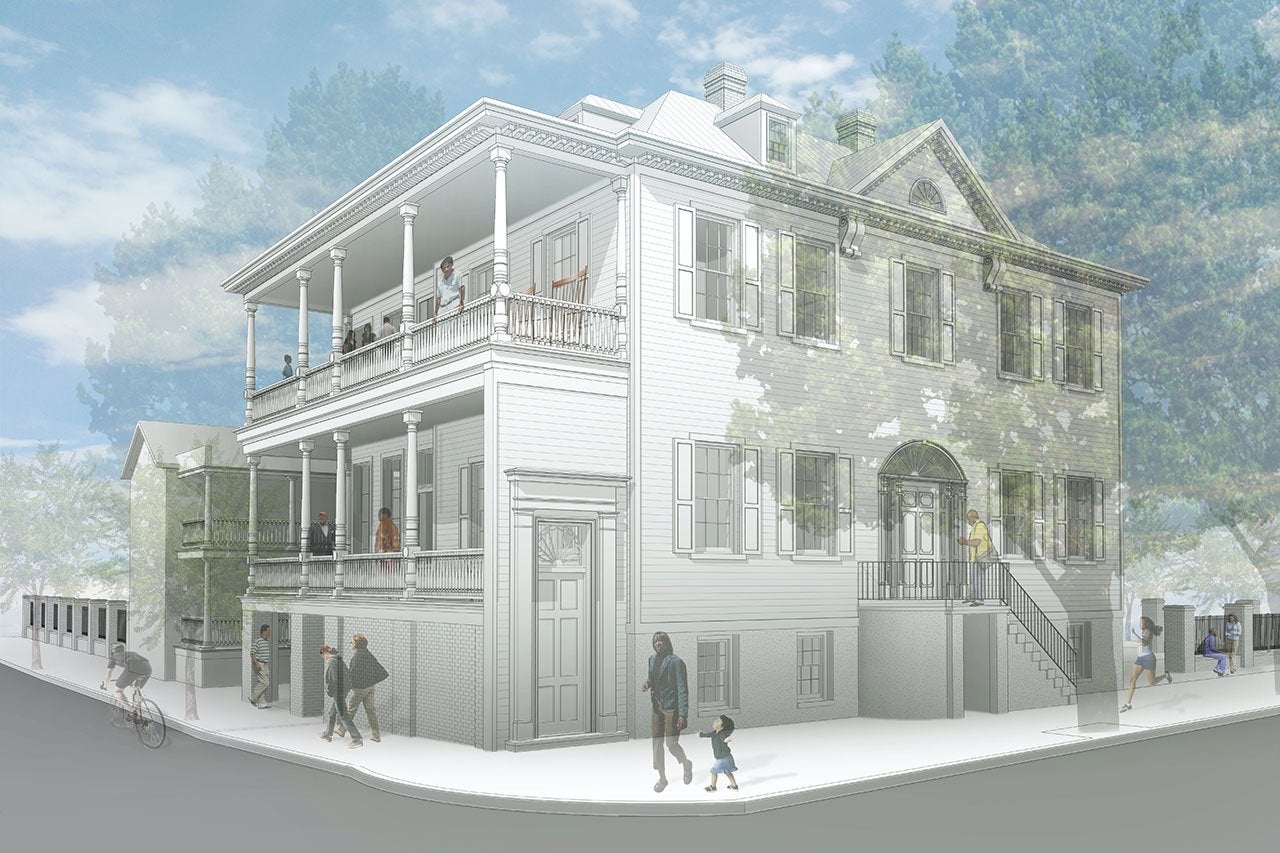Above: A rendering of the renovated Edward J. Tuccio ’91 Student Success Center at 58 George Street.
With nine different schools at the College of Charleston, students tend to frequent certain areas of campus more than others, but there’s one place of importance to all the College’s future graduates: the Career Center.
Day in and day out in their Lightsey Center offices, the Career Center staff help guide students to internships, land jobs after graduation or get into graduate school. But they know that a student’s success isn’t just about getting a job: It’s also about having the skills to navigate the workplace with confidence and leaving college surefooted, with a clear vision of their future.
And thanks to an overwhelmingly generous philanthropic gift by Edward Tuccio ’91 and his wife, Kimberly, to transform 58 George Street, the historic home on the corner of George and St. Philip streets, the Career Center and student success will soon be front and center in the heart of campus. After conversations with CofC President Andrew T. Hsu about his vision for the space and how it will symbolize the College’s dedication to student success, the Tuccios made a commitment to name the center and support the building’s renovation and programming.
“The Edward J. Tuccio ’91 Student Success Center is going to be a catalyst for change on our campus, providing critical support to our students and alumni for career development,” says Hsu.
With inviting meeting space, personal attention from staff dedicated to student success and an emphasis on individual student career development, the Student Success Center will be a hub for personal and professional development, including financial wellness initiatives like access to an interactive platform, iGrad, which provides personalized tools and financial planning support for students; financial wellness workshops; and an employee dedicated to helping students understand and develop financial planning skills.
As a longtime residential real estate developer in Ridgefield, Connecticut, the project is right in Tuccio’s wheelhouse. “This is something I always thought was necessary and valuable to the future success of the College,” he says, “and it is an honor to be a part of it.”
Tuccio is especially interested in the usability of the building for students. “We want to make sure that every inch of the place is usable, has the right purpose and an easy flow,” he says. “We want every student who walks in that door to walk out with a smile.”

58 George Street will undergo an extensive renovation to house the Career Center as well as other student success services.
Built by planter Bernard Elliott in 1803, the three-story structure served as apartments in 1952 before the College acquired and restored it in 1971, after which it served as the John Rivers Communication Museum.
Perhaps no one is more excited about building’s reimagined purpose than Jim Allison, the executive director of the Career Center, who feels the central location will contribute significantly to the student experience, while bolstering the academic distinction of the College as well as employer support of experiential learning and full-time jobs.
“The Edward J. Tuccio ‘91 Student Success Center will help organize our resources in the common pursuit of improving student retention, persistence and completion,” he says. “The evolving demographics of college students, educational funding, an ever-changing workforce, financial barriers, new technologies and access to data extending throughout a student’s undergraduate experience are all factors shaping the institutional mission to ensure students not only complete their degrees but also live fulfilled lives beyond graduation.”
At the urging of a friend, Tuccio transferred to the College in 1988 after a semester at Providence College in Rhode Island. The quality of the professors at CofC really stood out to Tuccio, who majored in business administration.
“The professors were distinguished role models for me,” he says. “Many of them were business owners first and dedicated, committed professors on the side. They provided me with educational tools needed to successfully operate a business along with valuable life lessons that I still utilize today.”
After working for Lehman Brothers in Atlanta for several years following graduation, Tuccio and his brother started a successful residential development company back home in Ridgefield.
Now wanting to pay it forward, he hopes his gift will inspire continued support of student success efforts at his alma mater.
“I think if people are shown what the opportunities are for a philanthropic investment in the College, it can make a world of difference,” says Tuccio. “You just have to make them aware of it. The possibilities for the College are endless.”





